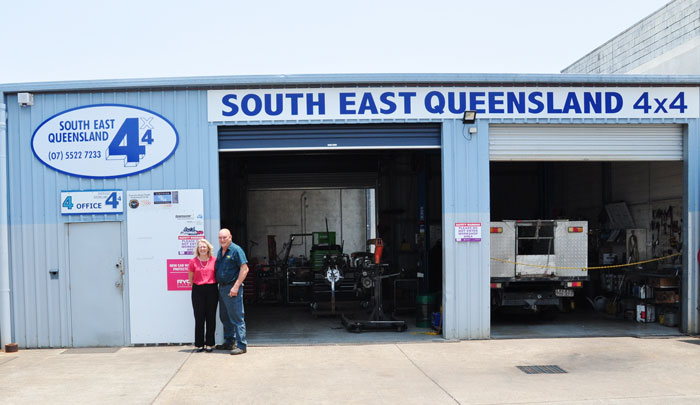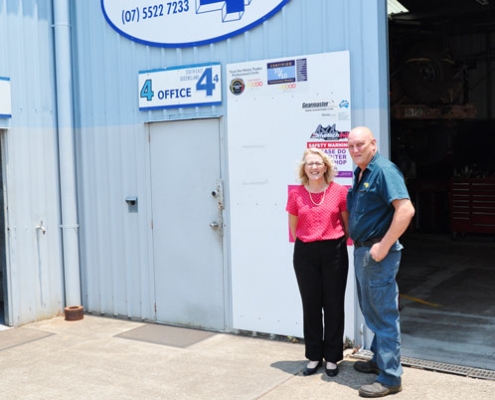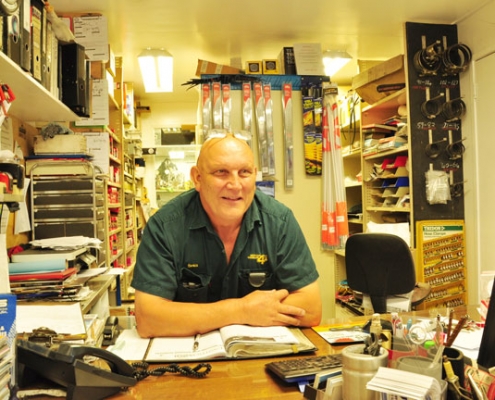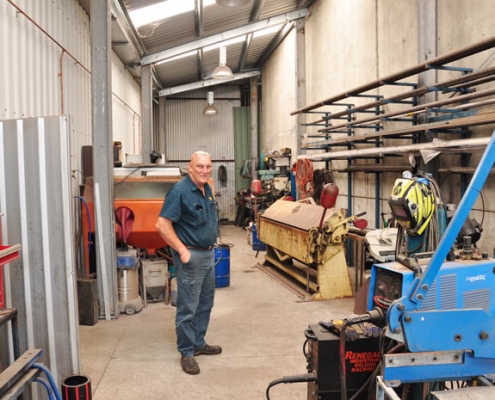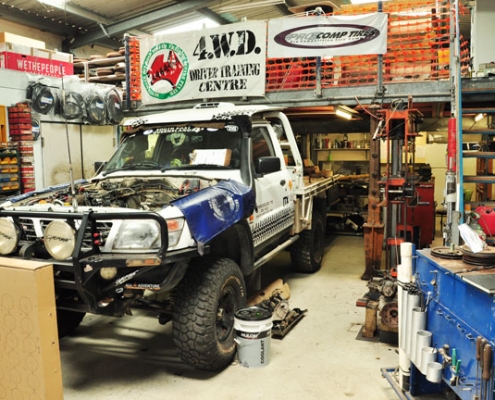MTA Q&A with South East Queensland 4×4,
Sean Calcino has been immersed in the world of 4WDs for more years than perhaps he’d care to remember after wife Mandy sparked his interested in the pursuit when they met in the 1980s. He has competed as a driver and navigator at the top level in Australia 4WD motorsport but equally enjoys camping trips with family and friends. Here, Sean and Mandy talk about South East Queensland 4×4 – the business he set up on the Gold Coast 28 years ago and which offers 4×4 servicing and maintenance, tuning, diagnostics, fabrications and repairs amongst other services – and discuss why being an MTA Queensland member matters, as well as the issues facing this booming sector of the industry.
How did South East Queensland 4×4 come to be established?
SC: I used to work for another mechanic on the Coast and was having a few issues. My father-in-law, who was very successful in the field of surveying, said to me, ‘you might as well go broke working for yourself as working for someone else’! And I thought, that’s true!
MC: So, Sean arrived home one afternoon and said, ‘That’s it. I’m working for myself’.
SC: That was in 1991. I spent a couple of years working out of our home at Nerang, then a friend who was a diesel engineer and who I met through 4WD club, rented me the back half of his shed and I had seven years there until he sold the business and retired.
MC: This is our third premises and we’ve been here since 2007.
SC: I did my apprenticeship on Holdens here on the Coast. I actually hated my apprenticeship with a passion! Working in a dealership doing the same thing over and over again was just boring. So, after I finished my apprenticeship in 1979, I spent just another year there and then went into the building trade for a few years.
Then I decided to travel, doing the Australian thing of going overseas, catching trains and buses, hitchhiking, and doing it on the cheap. It got to the stage
I was going to be one of those Australians who disappear into the woodwork overseas, never to be seen back in Australia again! My plan was to spend 10 or 15 years to see what I could see.
Then I spoke to mum one day and she explained that my sister was getting married and, as the oldest in the family, I’d be giving her away at the wedding. That was the duty. That was in 1983 and I was in Kathmandu. I came home from there and my sister didn’t get married!
Then I met Mandy, who wasn’t interested in going overseas, and I got a job through a friend at Dallow’s Nursery at Southport. A mate and I worked out a job share with them as mechanics. We were fixing and servicing everything – tractors, loaders, all sorts of things. It was doing that job that I discovered I enjoy the problem-solving side of mechanics as well as the physical side of building bits and pieces.
I then worked for a crane company for over a year, then for Citibus on the Coast and then moved into 4WDs with an established business.
By then I’d got sick of climbing into heavy machinery, and I get a sore back leaning over sedans and that sort of thing, so I figured 4WDs were about the right height for me!
I got into 4WDing mainly through Mandy. She is an avid 4WDer and I joined the Gold Coast 4WD Club and have competed as a driver and navigator throughout Australia. We’ve enjoyed the whole range of 4WDing, from camping to extreme competition.
How many staff do you have?
SC: We have one other mechanic plus a fourth-year apprentice. We have had more staff in the past but found that too many became unwieldy.
MC: Because Sean wants to work on the vehicles, because that’s what he loves, as well as run the business, we tried a workshop manager for a while, but that didn’t work for us. So we downsized to keep it manageable. It means Sean can run the business but also be on the tools.
SC: I take on jobs to keep my brain ticking over. I like projects that stretch me, that need research and that the client understands won’t be done quickly. The interesting part is working out how’s it all going to go together – the sticking it all together isn’t as exciting for me.
Why is being an MTAQ member important?
SC: I’m a great believer in the need for fighting forces. We need bodies prepared to say, ‘Hey, this isn’t right and we need to do something about it’, and to make us aware of changes. The government is always changing things such as consumer laws or industry regulations. It’s about advocacy and information. I’ve been a member for almost two decades. I am not very active but it’s important to support them even if it’s just via membership fees, to keep them working and doing what they do for us.
I’m also a member of the Institute of Mechanical Engineers.
MC: The good thing also about MTA Queensland is that it’s multi-purpose, has resources, and encompasses all aspects of the industry. It’s not just for motor mechanics, it’s all sectors.
What are the challenges facing the industry?
SC: I read somewhere that the 4WD and caravan industry has grown 220 per cent in the past five years and it’s a little like the pink batt scheme a few years ago – there were 400 installers before the scheme and when it was brought in there were 3000!
So, we have a sudden surge in the number of so-called 4WD experts in the industry. Regular mechanical businesses used to say, ‘No, it’s a 4WD, I won’t touch that’. Now, they are doing everything.
And the problem is that in many cases they then subcontract it out and a lot of time that work just isn’t up to spec.
I’ve always said to my employees, and it’s something everyone in the industry needs to understand, that if it’s not done right, it’s not just an inconvenience. Our customers could be here Monday and by Wednesday be in the middle of the Simpson Desert. And if something breaks out there, they may not see anyone for the next two weeks. It’s not an inconvenience, it’s life threatening. We do have better communications now but that doesn’t alter the fact it’s your work they’re relying on. There’s too many in the industry with a ‘yeah, it’s all good, that’ll do you’ attitude.
MC: It’s a very niche part of the market and people expect their vehicles to perform in extreme conditions and situations. If they are prepared correctly they will, unless they do something to compromise that.
There’s also the concern of 4WD owners not understanding what their vehicles can and can’t do and what they’ve been prepared to do. All of our staff know what’s expected of a vehicle off road. They get it.
What’s the future look like for the 4WD industry?
SC: We’re now in a time when everything is driven by sales. As long as it’s still growing, we will keep getting more models and accessories offered in our marketplace and a lot of what’s offered out there just isn’t right or useful to the vehicle.
The rise of the internet has meant everyone’s an expert and it’s confusing. There’s also a lot of ‘media’ that’s generated by manufacturers. We need independent and authoritative voices in the industry.
There’s also the problem with the perception of what looks good. To me, a well-set-up 4WD doesn’t need to be high. Most of the time what we want is for our 4WD to handle well on the road – the massive lift kits can be just dangerous and we need, as an industry, to regulate that sort of thing. An old mechanic told me years ago, and he was spot on, that, ‘Toyota, Nissan and all the rest spend millions of dollars on making their vehicles the best. Why is it two Australians with a carton of beer think they know better?’
You need to work out why they’ve done before you modify it. If you work out why, you’ll do a better job, get a better result. Too many people just jump in to modify it.
We’re seeing EVs and hybrids growing in numbers. Do hybrids have a place in 4WDing?
SC: They do and slowly we’re seeing more charging stations appearing. But that won’t happen overnight, of course.
They will be fine as long as their 4WD systems work. 4WDing is all about wheel placement. It doesn’t matter about big tyres and diff locks, etc, if you can put your wheels in the right place, that’s the science.
Source: Motor Trader E-Magazine (Dec 2019/Jan 2020)
17 Dec 2019




